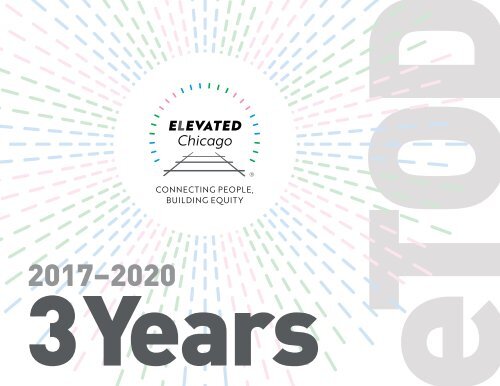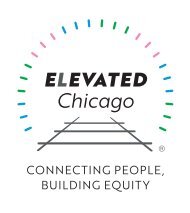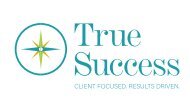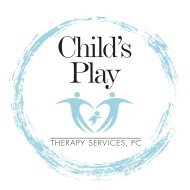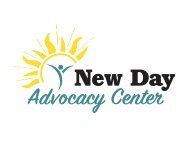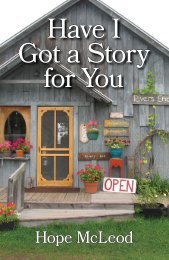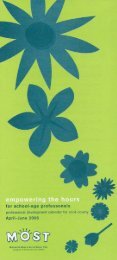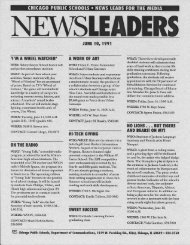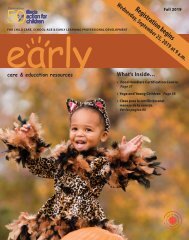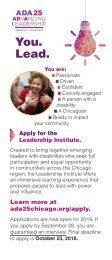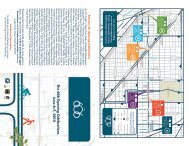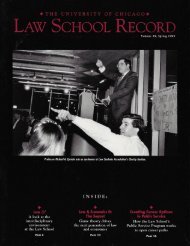ElevatedChicago 3-Year Impact Report
You also want an ePaper? Increase the reach of your titles
YUMPU automatically turns print PDFs into web optimized ePapers that Google loves.
ELEVATED<br />
Chicago<br />
CONNECTING PEOPLE,<br />
BUILDING EQUITY<br />
®<br />
2017–2020<br />
3<strong>Year</strong>s
There’s a proverb, “if you want to go fast,<br />
go alone; if you want to go far.…”<br />
Funders<br />
Elevated Chicago brings together a national and local movement to apply a<br />
racial equity lens to urban development. Our impact is rooted in our origin:<br />
an idea to connect and build a community of movers and shakers through<br />
the Strong, Prosperous And Resilient Communities Challenge, or SPARCC.<br />
SPARCC sought to identify six regions across the U.S. that could take on a<br />
complex challenge: <strong>Impact</strong>ing their built environments by applying a racial<br />
equity lens to urban planning and development, transit, public health, arts<br />
and culture, sustainability and more.<br />
And so, in 2016, a small group of community builders, developers and<br />
funders gathered to discuss which Chicago organizations could be tapped<br />
to form a collaborative tenacious enough to take on the big issues affecting<br />
development in Chicago’s communities of color: gentrification, depopulation,<br />
disinvestment, lack of trust, flawed narratives, and the like. Elevated<br />
Chicago launched in 2017 when SPARCC chose Chicago as one of its six<br />
national sites. Here, we would explore the catalytic power of Chicago’s<br />
public transit system to spark community revitalization, public and private<br />
investments, cultural resilience and access to public resources, and more.<br />
By summer, our group had formalized our steering committee structure and<br />
hired a program director. By the end of the year, we had made our name and<br />
logo official, awarded tens of thousands of dollars in grants for community<br />
led activation of CTA station areas, and we were ready to host our first<br />
symposium on equitable transit-oriented development (eTOD).<br />
Time has moved quickly since that first idea. Over the past three years, we<br />
have evolved from a small team to a group of about 100 people who comprise<br />
our steering committee, leadership council, working groups, and community<br />
tables. And we have made hundreds of friends and partners throughout the<br />
Chicago region, the SPARCC network, even globally!<br />
As we’ve worked to raise awareness of eTOD, our accomplishments,<br />
key learnings and adaptations have been many. And so have been the<br />
challenges. Still, we believe that eTOD can solve our city’s challenges, from<br />
the longstanding inequities built in our city’s planning and development<br />
systems, to the recent impact of the covid-19 pandemic.<br />
This report shares highlights from Spring 2017 to Spring 2020. It showcases<br />
our three years of impact, one idea, one investment, one community at<br />
a time.<br />
Robert Wood Johnson Foundation<br />
Strong, Prosperous and Resilient<br />
Communities Challenge<br />
Elevated Chicago 3-<strong>Year</strong> <strong>Impact</strong> <strong>Report</strong> • 2
Community engagement<br />
The past three years of hard work and organizing by Chicagoans<br />
has resulted in significant equitable transit-oriented development<br />
(eTOD) wins in their own neighborhoods. These wins were propelled<br />
by proactive engagement and collaboration by local residents and<br />
Elevated Chicago partners and resulted in more community input in<br />
development decisions.<br />
In November 2018 over 300 residents of the Logan Square Blue Line<br />
eHub marched together to protest high rents and support a proposed<br />
100-unit affordable housing project on Emmett Street, adjacent to<br />
the Logan Square of the CTA stop. In May 2020, as a result of tireless<br />
advocacy by the community, the City Council unanimously agreed to<br />
allocate $24 million in tax exempt bonds toward the Emmett Street<br />
project. The nonprofit developer, Bickerdike Redevelopment Corp.,<br />
is now charting a path toward construction in 2020.<br />
In 2019, The Center for Changing Lives (CCL) and Logan<br />
Square Neighborhood Association (LSNA) collaborated<br />
on a Community Benefits Agreement with Blue<br />
Star Properties, whose new hotel and restaurant<br />
property will sit right outside of the Logan Square<br />
Blue Line CTA station. As part of the CBA, the<br />
developer committed to having at least 75% of<br />
its employees be neighborhood residents and to<br />
paying them a minimum of $17 an hour.<br />
Communities came together to celebrate as<br />
well as advocate. The 2018 Chicago Resilience<br />
Festival in the California Pink Line eHub was<br />
organized to celebrate the end of a year’s worth<br />
of creative placemaking in the form of art and<br />
stormwater management devices near four CTA<br />
stations around the city to further climate and<br />
cultural resilience. Residents turned up to dance,<br />
paint, eat and celebrate Chicago’s diversity.<br />
Hundreds of Logan<br />
Square residents<br />
participated in<br />
the MARCH FOR<br />
EQUITY organized<br />
by Logan Square<br />
eHub partners<br />
(2018)<br />
Community event at former Chicago Public<br />
School and future OVERTON BUSINESS<br />
AND TECHNOLOGY INCUBATOR, located in<br />
Elevated Chicago’s 51st eHub (2019)<br />
CHICAGO RESILIENCE FEST IN DOUGLASS PARK celebrated<br />
the work of community organizations that received Climate<br />
and Cultural Resilience grants from Elevated Chicago (2018)<br />
Elevated Chicago 3-<strong>Year</strong> <strong>Impact</strong> <strong>Report</strong> • 3
Systems Change with the City of Chicago<br />
Since our inception, Elevated Chicago has advocated for the City of Chicago to make<br />
its transit-oriented development (TOD) policy more equitable by covering more<br />
communities, by going beyond train stations to include heavily used bus routes, and<br />
by explicitly calling for the development of more affordable, accessible housing. Our<br />
advocacy is having impact.<br />
As of this writing, a recommended plan for future TOD in Chicago, centered on equity,<br />
is being finalized for review by the City of Chicago. The policy recommendations are<br />
expected to be made public on August 17, 2020, at which time Chicago residents will have<br />
30 days to comment. After that, Chicago’s 50-member City Council, City departments<br />
and agencies, and the Mayor’s Office, will review and, ideally, start adopting the<br />
recommendations as formal policy.<br />
The plan was developed and written by an eTOD Working Group comprising more<br />
than 40 people representing community-based and citywide organizations, and City of<br />
Chicago departments (Housing, Planning and Development, Transportation, and Public<br />
Health), as well as the Chicago Transit Authority and the Chicago Metropolitan Agency<br />
for Planning. The Working Group will convene via in-person and virtual meetings and<br />
workshops, pending public health guidelines and Elevated Chicago will make grants to<br />
community-based organizations to enable their participation and to fund community<br />
engagement events.<br />
The Working Group’s policy recommendations seek to address what we<br />
call “the two sides of displacement”: First, preventing displacement<br />
on the city’s North Side, where many Black and Brown and low-income<br />
families have too few affordable housing options as construction of<br />
small-unit luxury apartments has flourished; and second, attracting more<br />
development and investment without displacement to the South and West<br />
Sides, whose residents would benefit from jobs, housing, services and<br />
amenities, walkability and safety that would follow.<br />
Recommended measures include: that the City of Chicago coordinates<br />
incentives for developers to encourage affordable housing near transit,<br />
particularly in communities where none or little exists; that City<br />
departments work more cohesively on the connected issues of planning<br />
and zoning, transit, parking and street design, affordable housing, and<br />
public health; and, that public engagement be a required and wellresourced<br />
strategy, so that community members have voice and ownership<br />
in what gets built in their neighborhoods.<br />
Visit our website in mid-August to read our policy recommendations.<br />
In April 2019, Chicago elected Lori Lightfoot as its first<br />
Black female mayor. Elevated Chicago members were<br />
invited to be part of her transition, and program director<br />
Roberto Requejo co-chaired the Transportation and<br />
Infrastructure committee, bringing eTOD formally into the<br />
administration’s agenda. Prior to the election, an eTOD<br />
ordinance had been passed by City Council in January<br />
2019, mandating the development of the Equitable Policy<br />
Plan for TOD by August 2020. The Mayor’s Office and<br />
Elevated Chicago have created a working group to build<br />
the plan, centering it on people of color and low-income<br />
communities and planting the seed for racial healing and<br />
transformation beyond this historic election.<br />
When we started Elevated Chicago three years ago, I knew we would<br />
be radically changing the way we plan and develop around transit in<br />
neighborhoods. What I didn’t know is that I would be making forever friends<br />
and family in Chicago and across the country! We have done and learned so<br />
much together, and there is so much more to accomplish to make Chicago<br />
the most equitable global city: let’s make that goal our next stop!<br />
— ROBERTO REQUEJO, Program Director<br />
Elevated Chicago 3-<strong>Year</strong> <strong>Impact</strong> <strong>Report</strong> • 4
It all began with a SPARCC<br />
The story of Elevated Chicago is about more than our city: it’s the<br />
story of how six different cities became part of a national movement<br />
to apply a racial equity lens to urban development and fundamentally<br />
change the way metropolitan regions invest in neighborhoods and grow.<br />
That movement is the Strong, Prosperous And Resilient Communities<br />
Challenge, known as SPARCC. It is an initiative of Enterprise Community<br />
Partners, the Low Income Investment Fund, and the Natural<br />
Resources Defense Council, with funding support from the Ford Foundation,<br />
The JPB Foundation, The Kresge Foundation, the Robert Wood<br />
Johnson Foundation, Ballmer Group, and The California Endowment.<br />
Prior to SPARCC, many individuals and organizations in Atlanta, Chicago,<br />
Denver, Los Angeles, Memphis and the San Francisco Bay Area<br />
were working towards racial equity, health, and climate resilience. By<br />
connecting us, SPARCC transformed separate community initiatives<br />
into a single powerful movement capable of creating meaningful<br />
change through partnerships and national influence.<br />
Elevated Chicago was launched with a three-year grant from SPARCC<br />
in 2017; our work since then led to securing a second round of<br />
funding from SPARCC in 2020.<br />
The ravages of COVID-19 have illuminated disparities in<br />
racial equity, health and environmental conditions.<br />
Finding hope these days is hard. But the past<br />
three years of SPARCC work have set the stage<br />
SPARCC focuses on city-wide<br />
and provided building blocks for an equitable<br />
change through partnerships. For example,<br />
and just recovery. As SPARCC leaders wrote<br />
in April 2020, “Despite unprecedented<br />
our work with the Chicago Metropolitan<br />
challenges across all of society, so much of<br />
Agency for Planning (CMAP) and Regional<br />
what is needed to respond and rebuild…<br />
Transportation Authority (RTA) is a<br />
is based on centering social, economic<br />
partnership success story. CMAP committed<br />
and racial equity. We all must remain<br />
committed to working with local partners<br />
resources to Elevated Chicago through a<br />
and lawmakers to advance the health and<br />
Local Technical Assistance Program grant for<br />
sustainability of communities nationwide –<br />
the Garfield eHub of the Green Line South —<br />
a goal that is now more important than ever.”<br />
the first time CMAP and RTA embarked<br />
Our path forward will not be easy, but these<br />
jointly in eTOD planning.<br />
first few years show what can be accomplished<br />
when we unite to make our communities strong,<br />
prosperous and resilient.<br />
ELEVATED CHICAGO WELCOMED NEARLY 100<br />
COLLEAGUES FROM SPARCC’S SIX REGIONS<br />
to “Celebrate Reflect Connect Imagine,” a<br />
national convening in 2019 to mark the end of the<br />
first three years of the SPARCC initiative, and<br />
to start planning the next three.<br />
Elevated Chicago 3-<strong>Year</strong> <strong>Impact</strong> <strong>Report</strong> • 5
Pipeline<br />
Projects<br />
Residents, organizers and<br />
community leaders in each<br />
Elevated Chicago eHub<br />
are working on projects of<br />
significance that will have<br />
great impact on the built<br />
environment, public health,<br />
climate resilience, access to<br />
arts and culture, and equity.<br />
We call these our pipeline<br />
projects.<br />
Since 2018, we have supported<br />
our eHubs’ work with<br />
grants, advocacy and technical<br />
assistance. We have also<br />
set metrics to measure the<br />
impact on equity and climate<br />
resilience, such as improved<br />
walkability and community<br />
cohesion. In 2019, we joined<br />
Enterprise Community<br />
Partners in launching Equity<br />
Forward, a recoverable grant<br />
pool to deepen our support<br />
for these pipeline projects.<br />
Get to know the projects<br />
here, and look out for our<br />
updates on them in 2021.<br />
OVERTON SCHOOL in Bronzeville.<br />
In the Green Line<br />
South eHub:<br />
Emerald South Economic Development<br />
Collaborative is seeking to create a cohesive<br />
visual identity for the Green Line South area<br />
throughout Washington Park and Woodlawn,<br />
resulting in coordinated development strategies,<br />
improved services, and engaged residents<br />
and businesses. Working with Borderless<br />
Studio’s Creative Grounds, the initiative<br />
will include place-making features, physical<br />
markers, memorialized plaques and art installations<br />
starting with the area surrounding<br />
the Overton School in Bronzeville. <strong>Impact</strong>:<br />
Decreased community economic hardship;<br />
decreased flooding; increased presence of<br />
local landmarks, symbols, cultural spaces and<br />
public art in the community; improved collaboration,<br />
cohesion, decision-making.<br />
LATINOS PROGRESANDO in Marshall Square.<br />
In the California<br />
Pink Line eHub:<br />
Latinos Progresando is seeking to acquire and renovate a vacant,<br />
former public library building and to create a new model of community<br />
health service delivery on Chicago’s southwest side. Its new<br />
resource center will serve as a community hub, providing access to<br />
immigration legal services, behavioral mental health screening and<br />
treatment, and trauma-informed group counseling sessions for all<br />
ages, along with a robust referral system. <strong>Impact</strong>: Improved mental<br />
health and wellbeing; decreased flood risk; improved walkability;<br />
increased neighborhood cohesion and belonging.<br />
Elevated Chicago 3-<strong>Year</strong> <strong>Impact</strong> <strong>Report</strong> • 6
WHEN NEW HOUSING OR BUSINESSES<br />
ARE BUILT NEAR TRANSIT, they<br />
should create opportunities for<br />
residents of various income levels,<br />
not just affluent people. But too often,<br />
exciting ribbon-cuttings are just the<br />
beginning of resident and cultural<br />
displacement.<br />
The Emmett Street apartments<br />
in Logan Square are a model of<br />
eTOD for both process and outcome.<br />
Built by Bickerdike Redevelopment<br />
Corporation, this development<br />
will create 100 affordable homes<br />
adjacent to the CTA station. It was<br />
supported by 100-plus organizations<br />
thanks to the advocacy of the Logan<br />
Square Neighborhood Association in<br />
partnership with Elevated Chicago.<br />
In the Logan Square<br />
Blue Line eHub:<br />
Next to the station, Bickerdike Redevelopment Corporation<br />
will build 100 units of affordable housing for families, and<br />
LUCHA is seeking to preserve affordable homeownership<br />
and rental opportunities in West Logan Square and Hermosa<br />
through acquisition and rehabilitation of properties through a<br />
Land Trust. This strategy will preserve the stock of naturally<br />
occurring affordable housing in the target area by creating<br />
a competitive, self-regenerating acquisition fund; rehabbing<br />
multi-family buildings; and cultivating a pipeline for low-tomoderate<br />
income families. <strong>Impact</strong>: Decreased community<br />
economic hardship; decreased flood risk; increased presence<br />
of local landmarks, symbols, cultural spaces & public art in the<br />
community; increased community cohesion.<br />
Community engagement<br />
around pipeline projects<br />
in KEDZIE-HOMAN BLUE<br />
LINE EHUB.<br />
In the Kedzie-Homan<br />
Blue Line eHub:<br />
In the Kedzie-Lake<br />
Green Line eHub:<br />
The Garfield Park Community Council is seeking support to<br />
address barriers to community ownership and the formation<br />
of a community housing coalition (comprised of residents,<br />
churches and activists) to engage with housing plans and<br />
developments such as Garfield Green, a new, 40- to 80-unit<br />
housing development (previously known as C40); being<br />
developed by Preservation of Affordable Housing (POAH)<br />
at Kedzie and Fifth Avenues, along a City of Chicagodesignated<br />
“Resilient Corridor.” <strong>Impact</strong>: Increased resident<br />
retention, decreased community economic hardship,<br />
improved air quality.<br />
The Foundation for Homan Square is seeking to transform public, urban space<br />
with community-driven plans by developing affordable housing for current and<br />
new residents, and providing opportunities for retail entrepreneurs to launch<br />
or expand their businesses. Project components include the Homan/Harrison<br />
mixed-use project (new construction of transit-oriented development project<br />
at a gateway intersection), and affordable rental housing units (construction<br />
of 50-60 new units of affordable housing on vacant lots acquired through the<br />
Cook County Land Bank and City of Chicago). <strong>Impact</strong>: Improved walkability;<br />
increased neighborhood cohesion and belonging; improved air quality;<br />
increased resident retention.<br />
Elevated Chicago 3-<strong>Year</strong> <strong>Impact</strong> <strong>Report</strong> • 7
Our grant-making<br />
Since 2017, we have awarded more than $2.9M in grants to<br />
organizations in Chicago that support eTOD – from pre-development<br />
funds for capital projects to programming dollars for walkability<br />
studies, capacity-building for community collaboration, increasing<br />
climate resilience and arts and culture events for the general public.<br />
To stay true and accountable to our commitment to racial equity, 67%<br />
of our grants ($1.75M) have been made to organizations led-by people<br />
of color advancing eTOD and 66% ($196K) of our total contracts have<br />
been made to MBEs. The majority of our grants are approved by the<br />
Steering Committee either through approval of the annual budget or<br />
by full review of applications.<br />
Art near Elevated Chicago eHub stations<br />
New community-driven art was created in partnership with Elevated Chicago, inlcuding<br />
projects through grants to Center for Neighborhood Technology.<br />
PRE-DEVELOPMENT AND EQUITY FORWARD: $1,080,000<br />
WORKING GROUP: $415,000<br />
CLIMATE AND CULTURAL RESILIENCE: $352,000<br />
COMMUNITY TABLE COLLABORATION: $320,000<br />
WALKABILITY AND HEALTHY CHICAGO 2.0,<br />
WITH THE CHICAGO DEPT. OF PUBLIC HEALTH: $300,000<br />
RACIAL EQUITY: $250,000<br />
COMMUNITY-LED DATA ANALYSIS: $105,000<br />
ACTIVATION OF CTA STATIONS: $100,000<br />
ECODISTRICTS: $100,000<br />
REAL ESTATE SERVICES AND<br />
TECHNICAL ASSISTANCE: $75,000<br />
ETOD WORKING GROUP: $40,000<br />
DIVERSITY, EQUITY AND INCLUSION CURRICULUM<br />
AND LEARNING COHORT: $30,000<br />
Art in the eHubs: (top) An outdoor mural on 51st Street in GREEN LINE SOUTH;<br />
(bottom) mural planning in LOGAN SQUARE BLUE LINE<br />
Elevated Chicago 3-<strong>Year</strong> <strong>Impact</strong> <strong>Report</strong> • 8
Art in the eHubs: Mural at Anthony Overton Elementary in GREEN LINE SOUTH<br />
Art in the eHubs: At the Garfield Park Community Council Garden in<br />
KEDZIE-LAKE, with support from CNT<br />
Art in the eHubs:<br />
Artist installation<br />
of a viaduct<br />
mural near<br />
CALIFORNIA<br />
PINK LINE<br />
Elevated Chicago 3-<strong>Year</strong> <strong>Impact</strong> <strong>Report</strong> • 9
Other art near transit<br />
Art projects in our eHubs represent community members’<br />
experiences, provoke conversations, enhance walkability, and add<br />
beauty to daily life. To learn more about recent art initiatives near<br />
transit, click here.<br />
Art in the eHubs: Artistic woodwork at the KEDZIE-LAKE GREEN LINE installed<br />
by Safe Foundation and BKE Design and featuring inspirational quotes from<br />
Black leaders and artists<br />
What an amazing three years this has been!<br />
I am so grateful to have worked alongside so many<br />
creative, dedicated colleagues, and with so many<br />
impactful organizations. Over the past three<br />
years we have laid a strong foundation, and built<br />
an incredible network committed to developing<br />
solutions to begin addressing the systemic racial<br />
inequities that have held plagued our communities<br />
for generations. Through collaboration and<br />
community, we have accomplished so much<br />
together, and the journey continues.<br />
— MARLY SCHOTT<br />
“Guns into Shovels” was initially conceptualized by artist Pedro Reyes<br />
as a response to gun violence in Culiacán, Mexico. In partnership<br />
with the School of the Art Institute of Chicago (SAIC), Reyes<br />
reproduced his work in the North Lawndale neighborhood in 2017.<br />
Reyes worked with SAIC and North Lawndale residents to melt down<br />
gun parts; then Lawndale Forge turned them into shovel heads.<br />
The shovel handles were created by youth involved in woodworking<br />
programs at the Greater West Town Training Partnerships, and<br />
community members used the shovels to plant the first trees of the<br />
Oaks of North Lawndale initiative near the Kedzie-Homan CTA<br />
station. By symbolically transforming guns from “agents of death into<br />
agents of life,” the initiative brought people together to grow a safer<br />
and healthier community.<br />
In 2018, we worked with two Black-led organizations, BKE Designs<br />
and the Safer Foundation, to create “Spellcasting for Peace”. BKE<br />
Designs is a Chicago-based design firm and the Safer Foundation<br />
is an organization that provides employment training to justiceinvolved<br />
people to help them live more vibrant and sustainable lives.<br />
BKE Designs and Safer’s program participants created plaques<br />
with uplifting messages by Black thinkers and activists that were<br />
permanently displayed on the Green Line’s Kedzie-Lake station. The<br />
idea was to add positivity to the physical environment and inspire<br />
people as they go about their daily lives. “Spellcasting for Peace” was<br />
intentionally designed so that the process and end product benefitted<br />
the creators as well as the people and place receiving the artwork.<br />
Elevated Chicago 3-<strong>Year</strong> <strong>Impact</strong> <strong>Report</strong> • 10
We’ve Been Training for This<br />
By Leslé Honoré<br />
Don’t listen to them<br />
The voices that say<br />
you will be able to work<br />
At home<br />
The same way you work<br />
At your cubicle<br />
In your office<br />
Safe in the walls of infrastructure<br />
Built around you<br />
Brick and mortar that divides<br />
The privileged<br />
From the heroes<br />
Who are just now being called<br />
Essential<br />
Because this has changed us<br />
Will continue to change us<br />
But we have trained for this<br />
We who know the power of a we<br />
We who will not let the fists of policy<br />
Beat the faces of the invisible<br />
We know how to link arms across this city<br />
We have implanted ourselves in this city<br />
On the streets<br />
In the high rises<br />
On the 5th floor<br />
We have been training for this<br />
And this is not a drill<br />
This is another battle in this long war<br />
To shake off the individual<br />
To cement ourselves in community<br />
To protect those who make our lives<br />
What they are<br />
Without a living wage<br />
Without sick days<br />
Without retirement<br />
Without acknowledgement<br />
we are sounding the alarm<br />
Business as usual is done<br />
Normal was never normal<br />
We are activating<br />
In all the ways we know how<br />
And in some ways we have never dreamed<br />
And we will be weary<br />
And we will ache<br />
For the people we can not save<br />
And for time we can not recoup<br />
And we are allowed<br />
To bend a little<br />
Because we don’t break<br />
To rest a little<br />
Because we give more than we take<br />
To pause a little<br />
Hope a little<br />
And be human a lot<br />
We will lend each other strength<br />
Lend each other peace<br />
We will lend each other love<br />
So we can return to the trenches<br />
We will find our way out of this<br />
Through this<br />
Together<br />
Leading with love<br />
Because we have been training for this<br />
© 2020<br />
(Above) OVERTON DAY AT ANTHONY<br />
OVERTON ELEMENTARY brought<br />
together community members to<br />
explore the role of schools in<br />
urban development.<br />
(Right) OAKS OF NORTH LAWNDALE<br />
brings together the North Lawndale<br />
community, the City of Chicago<br />
and the School of the Art Institute of<br />
Chicago to reimagine the neighborhood<br />
as a healthy, peaceful and tree-lined place.<br />
Stormwater/flooding management<br />
Developing more climate resilient communities is an Elevated Chicago goal. In our<br />
eHubs, poor stormwater management causes homes and community assets to flood,<br />
and extreme temperatures and poor air quality hurt people’s health. That’s why we<br />
support tree planting, solar panel installation, and stormwater management devices<br />
in all our eHubs. Here’s two of our initiatives:<br />
Oaks of Lawndale in the Kedzie-Homan eHub<br />
In 2017, the School of the Art Institute of Chicago (SAIC) and two community-based<br />
organizations, Homan Grown and the North Lawndale Community Coordinating Council,<br />
launched the Oaks of North Lawndale, an art and community development project.<br />
The project is recreating the community’s urban forest by planting and maintaining<br />
over 7,000 trees in North Lawndale, where there are fewer trees than any other area<br />
in the city. Since launching at Nichols Tower, the group has planted more than 1,000<br />
trees and their work has been recognized by the Chicago Region Trees Initiative.<br />
Climate Resilience grants and art projects<br />
The Center for Neighborhood Technology’s Climate and Cultural Resilience Program<br />
(CCR) aims to adress climate change challenges and strengthen local arts and<br />
culture near CTA transit stops. Several CCR grants have been awarded for green<br />
infrastructure demonstration projects with complementary public art pieces that<br />
illustrate how investments in climate resilience benefit local cultural and<br />
economic resilience.<br />
The Overton Park Green Transformation is a CCR-funded initiative.<br />
Anthony Overton Elementary School, located in the Green Line South<br />
eHub, was one of 49 public schools shuttered in 2013 by the City of Chicago.<br />
Since 2018, the school parking lot has been transformed by BORDERLESS<br />
STUDIO’s Creative Grounds initiative, which explores the community<br />
and urban roles of school grounds following mass school closures in<br />
Chicago. The group has installed art and painted large-scale<br />
maps showing public schools closed in 2013, and proposed<br />
new uses for those schools along with Bronzeville’s<br />
formal and informal assets. A rainwater garden is<br />
being built on the former school’s parking lot.<br />
CCR supporters and partners include Elevated<br />
Chicago, Enterprise Community Partners,<br />
Arts+Public Life, Garfield Park Community<br />
Council, Logan Square Neighborhood Association,<br />
LUCHA, Open Center for the Arts, and Washington<br />
Park Development Group.<br />
Elevated Chicago 3-<strong>Year</strong> <strong>Impact</strong> <strong>Report</strong> • 11
SYMPOSIA<br />
Elevated Chicago Symposia<br />
The Elevated Chicago symposia on eTOD demonstrate our<br />
commitment to increase awareness and dialogue about the people,<br />
places and processes that make transit-oriented development<br />
equitable. Our 2017, 2019 and 2020 events brought together some of<br />
Chicago’s most influential planners, organizers and advocates from<br />
public, private and non-profit institutions. They discussed ways to<br />
plan a city that works for everyone, centering development around<br />
transit as an asset, and strengthening neighborhoods without<br />
displacing people.<br />
Each symposium was designed with members of our steering<br />
committee and community tables, who helped shape topics<br />
and conversations on issues such as: developing place-based<br />
partnerships to identify, procure and secure funds for eTOD<br />
projects; retaining human and cultural capital in communities<br />
of color; gathering community input and advocating for<br />
equitable policies; incorporating environmental, economic<br />
and culturally resonant principles and best practices in<br />
development; and, dismantling top-down approaches so everyone<br />
can have a seat at decision-making table.<br />
Our keynote speakers have been: Dr. Julie Morita, past<br />
commissioner of the Chicago Department of Public Health and now<br />
executive vice president of the Robert Wood Johnson Foundation;<br />
Dr. Helene Gayle, president and CEO of The Chicago Community<br />
Trust; Justin Garrett Moore, executive director of the New York City<br />
Public Design Commission and co-founder of BlackSpace; Dr. Allison<br />
Arwady, commissioner of the Chicago Department of Public Health;<br />
and Andre Brumfield, urbanist and architect, Gensler. Each event<br />
also involved local artists, whose performances gave beautiful and<br />
layered context to inequities in planning and transit.<br />
Each symposium has been supported by the Federal Reserve Bank<br />
of Chicago, which has hosted the in-person gatherings, supported<br />
virtual ones, and housed our exhibit “Undesign the Redline,” and<br />
co-sponsored by Enterprise Community partners and the MacArthur<br />
Foundation.<br />
Our eTOD symposia give us time and space to come together to<br />
talk, to listen, to learn – sharpening our vision and growing the<br />
community of eTOD advocates.<br />
Symposium Speakers<br />
The following individuals, listed in alphabetical order by<br />
last name, were speakers at our past eTOD symposia.<br />
All affiliations are current as of July 2020.<br />
Daniel<br />
Aaronson, The<br />
Federal Reserve<br />
Bank of Chicago<br />
Harry Alston,<br />
Safer Foundation<br />
Hannah L.<br />
Anderson,<br />
Chicago Dept.<br />
of Public Health<br />
and Artist<br />
Create circles, not lines:<br />
Circles are about inclusion. Choose<br />
critical connections over critical mass.<br />
Move at the speed of trust — trust takes<br />
time in some cases, and while development<br />
and policies and political timing and funding<br />
have a pace and timeline, you [may] have<br />
to rethink and readjust to take the time to<br />
build the trust that’s needed or establish<br />
that trust that is necessary.<br />
— JUSTIN GARRETT MOORE,<br />
2019 keynote speaker<br />
Dr. Allison<br />
Arwady, Chicago<br />
Dept. of Public<br />
Health<br />
Juan Sebastian<br />
Arias, Enterprise<br />
Community<br />
Partner<br />
Lori Berko,<br />
University of<br />
Chicago, Office<br />
of the President<br />
Nootan Bharani,<br />
UChicago Arts,<br />
Arts + Public Life<br />
Jeremiah Boyle,<br />
Federal Reserve<br />
Bank of Chicago<br />
Andre<br />
Brumfield,<br />
Gensler<br />
Kirby<br />
Burkholder, IFF<br />
Michael Burton,<br />
Bickerdike<br />
Redevelopment<br />
Corporation<br />
Asiaha Butler,<br />
Residents<br />
Association<br />
of Greater<br />
Englewood<br />
(R.A.G.E.)<br />
Sarah Cardona,<br />
Metropolitan<br />
Planning Council<br />
Charlie<br />
Corrigan, JP<br />
Morgan Chase<br />
Foundation<br />
Maurice Cox,<br />
Chicago Dept.<br />
of Planning and<br />
Development<br />
Megan<br />
Cunningham,<br />
Chicago Dept. of<br />
Public Health<br />
Devin<br />
Culbertson,<br />
Enterprise<br />
Community<br />
Partners<br />
Jessica<br />
Davenport,<br />
Black Girls<br />
Break Bread<br />
Michael<br />
Davidson,<br />
The Chicago<br />
Community Trust<br />
Elevated Chicago 3-<strong>Year</strong> <strong>Impact</strong> <strong>Report</strong> • 12
Christian Diaz,<br />
Logan Square<br />
Neighborhood<br />
Association<br />
Bill Eager,<br />
Preservation<br />
of Affordable<br />
Housing<br />
Theo Edmonds,<br />
University of<br />
Louisville School<br />
of Public Health<br />
and Information<br />
Sciences<br />
Ghian Foreman,<br />
Emerald South<br />
Economic<br />
Development<br />
Collaborative<br />
Kendra<br />
Freeman,<br />
Metropolitan<br />
Planning Council<br />
Jennie<br />
Fronczak,<br />
LUCHA<br />
Justin Garrett<br />
Moore, City<br />
of New York<br />
Public Design<br />
Commission<br />
Public transportation provides access to resources.<br />
We need to do as much as we can to help these kinds<br />
of developments and projects be successful.<br />
— DR. JULIE MORITA<br />
Dr. Helene<br />
Gayle, The<br />
Chicago<br />
Community Trust<br />
Andrew Geer,<br />
Enterprise<br />
Community<br />
Partners<br />
Stephanie<br />
Gidigbi, NRDC<br />
Lucy Gomez-<br />
Feliciano,<br />
The Nature<br />
Conservancy and<br />
the Chicago Park<br />
District<br />
Juliana<br />
Gonzalez-<br />
Crussi, Center<br />
for Changing<br />
Lives<br />
Vito Greco,<br />
Elevate Energy<br />
Jacky<br />
Grimshaw,<br />
Center for<br />
Neighborhood<br />
Technology<br />
Leslé Honoré,<br />
Poet and author<br />
Aaron Johnson,<br />
Center for<br />
Changing Lives<br />
Deborah<br />
Kasemeyer,<br />
Northern Trust<br />
Bank<br />
Dr. Danielle<br />
Kizaire, Bronzeville<br />
Urban<br />
Development<br />
Aarti Kotak,<br />
PEAK6<br />
Vickie Lakes-<br />
Battle, IFF<br />
Adrienne<br />
Lange, Latinos<br />
Progresando<br />
Juan Carlos<br />
Linares,<br />
University of<br />
Chicago Law<br />
School<br />
Susan<br />
Longworth,<br />
Federal Reserve<br />
Bank of Chicago<br />
Bernard Loyd,<br />
Urban Juncture<br />
Inc.<br />
Omar Magana,<br />
OPEN Center for<br />
the Arts<br />
James Matanky,<br />
Matanky Realty<br />
Group<br />
Anna Mayer,<br />
Taller de Jose<br />
Gaylord Minett<br />
John Moon,<br />
Federal Reserve<br />
Bank of San<br />
Francisco<br />
Dr. Julie<br />
Morita, Robert<br />
Wood Johnson<br />
Foundation<br />
Mary Nicol,<br />
Office of the<br />
Mayor, City of<br />
Chicago<br />
Marisa Novara,<br />
Chicago Dept. of<br />
Housing<br />
Tarnynon<br />
Onumonu, Poet<br />
Rosa Y. Ortiz,<br />
Confeti, LLC<br />
Krysta Pate, Com -<br />
munity Reinvestment<br />
Fund<br />
Jair Pinedo,<br />
Sunshine<br />
Enterprises<br />
Melinda Pollack,<br />
Enterprise<br />
Community<br />
Partners<br />
Shelley Poticha,<br />
Natural<br />
Resource<br />
Defense Council<br />
Roberto<br />
Requejo,<br />
Elevated Chicago<br />
Shandra<br />
Richardson,<br />
The Chicago<br />
Community Trust<br />
Jake Schnur,<br />
MB Financial<br />
Marly Schott,<br />
Elevated Chicago<br />
Geoff Smith,<br />
Institute for<br />
Housing Studies<br />
at DePaul<br />
University<br />
Adrian Soto,<br />
Greater<br />
Southwest<br />
Development<br />
Corporation<br />
THE UNDESIGN THE REDLINE YOUTH SUMMIT,<br />
sponsored in 2019 by Elevated Chicago in<br />
partnership with Enterprise Community Partners,<br />
brought together 60+ young Chicagoans to explore<br />
the impacts of redlining, reflect on existing<br />
neighborhood assets, and find solutions to create<br />
equitable and climate-resilient spaces.<br />
Tyronne<br />
Stoudemire,<br />
Hyatt<br />
Corporation<br />
Kevin Sutton,<br />
Foundation for<br />
Homan Square<br />
Mike Tomas,<br />
Garfield Park<br />
Community<br />
Council<br />
Joanna Trotter,<br />
The Chicago<br />
Community Trust<br />
Lyndon Valicenti,<br />
Daylight<br />
Carmen<br />
Vergara,<br />
Esperanza<br />
Health Centers<br />
Ayanna<br />
Williams,<br />
YannaCello<br />
Joshua Wilmoth,<br />
Full Circle<br />
Communities<br />
Inc.<br />
Elise<br />
Zelechowski,<br />
Office of the<br />
Mayor, City of<br />
Chicago<br />
Mariia<br />
Zimmerman,<br />
MZ Strategies<br />
Elevated Chicago 3-<strong>Year</strong> <strong>Impact</strong> <strong>Report</strong> • 13
Free Range<br />
By Tarnynon (Ty-yuh-nuh) Onumonu<br />
My Chicago be grid-mapped<br />
Superman up high spot train car lines<br />
Like speeding bullet through cityscape<br />
What a sweet escape<br />
Fall asleep on one side blue/red<br />
Wake up black/white<br />
Always knew red split city black/white<br />
Never took issue with this until nightfall<br />
Better be on your side by nightfall<br />
But nevermind that<br />
CTA, the great equalizer<br />
Rich Dad, Poor Dad collide here<br />
Rush Hour, jam packed<br />
Personal space now mythic past<br />
All aboard the mystery machine<br />
Used to ride for hours just to Christopher Columbus neighbor-nooks<br />
unseen<br />
My scope widened every time I’d board a new line<br />
Why we be sectioned off, bracketed,<br />
Rather than just one Line<br />
Thoughts swirl as I read billboard signs<br />
Talkin bout, “ Building a New Chicago”<br />
But I ain’t seen nothin new on my side<br />
CTA reek of hope and despair<br />
Cloaked in stale loose cigarette smoke and school children’s candy<br />
wrappers<br />
This be Chicago feature, Chicago future<br />
Joy ride on buses<br />
Joy still be here<br />
Love still be here<br />
Youth Ready, witness their glistening eyes gleam<br />
Access, if they get it<br />
Believe me, they got it<br />
Open these unmarked borders<br />
Listen to these kids kidding around<br />
Can you hear them skipping the dozens over turnstiles?<br />
We fashion them complacent<br />
But they be curious<br />
Wanna see what’s on the other side<br />
Was far into my highschool years before I frequented the northern sector of Lake Shore Drive<br />
But why is that?<br />
When the city has always been mine<br />
Or is it?<br />
Why those from suburbs arrive downtown faster than us from the southside?<br />
This be my city plain, my city plan<br />
Before I take flight, I sit perched on this land<br />
Chicago, there’s still time to do right by me<br />
Since before the Great Migration,<br />
Legends of the fall have been yearning to be free<br />
Don’t trap us, don’t clip our wings<br />
Just to stealthily set up shop where we be quarantined<br />
Gentrification is real. We’re losing ground.<br />
Redline from 95th be expanding but you displace us now<br />
Then place your station inside our station<br />
We be over-policed like long lines marching towards the county<br />
We’re counting on this system collapsing and beginning anew<br />
Empathize with us. On your feet place our shoes<br />
What if your children were kept out of the Loop<br />
We deserve more than just a day at the Taste or Lollapalooza<br />
We are not this city’s disposable income<br />
This city’s scapegoat<br />
We only wish to roam.<br />
© 2017<br />
Bucket Boys wrists’ ricochet heartbeats off the air<br />
Their wooden staffs split traffic like red sea<br />
Come see my cityscape dream<br />
Elevated Chicago 3-<strong>Year</strong> <strong>Impact</strong> <strong>Report</strong> • 14
Collaborative People<br />
CT<br />
Logan Square<br />
Kedzie Corridor<br />
Capital + Programs WG<br />
CT<br />
More about our structure:<br />
CT<br />
Steering Committee<br />
Operations Committee<br />
Staff<br />
Systems Change WG<br />
Leadership Council<br />
California<br />
Knowledge Sharing WG<br />
Since 2017, Elevated Chicago has grown from the<br />
small team that conceived of our work to a<br />
diverse group of more than 100 people<br />
who comprise our steering committee,<br />
leadership council, working groups<br />
CT<br />
and community tables. We have<br />
expanded the definition, voices and<br />
stakes of equitable transit-oriented<br />
development by creating new systems<br />
of decision-making and re-envisioning<br />
leadership. Our bodies of governance<br />
are constructed to facilitate authentic,<br />
CT<br />
inclusive and effective community<br />
engagement, and power and ownership in<br />
decisions affecting the built environment.<br />
Green Line South<br />
Community tables at our sites are made up of neighborhood residents, community<br />
leaders and business owners, particularly those within the ½ mile radius of each<br />
station, and others with a close relationship to this area, such as participants in<br />
community programs or daily commuters. Our five community tables inform our<br />
strategies and determine our priorities for capital projects, programs, policies,<br />
narratives, data and technical assistance.<br />
Working Groups bring together community-based and region wide partners to<br />
provide technical assistance and capacity building to Elevated Chicago’s workplan<br />
in three areas: Capital & Programs, Systems Change, and Knowledge Sharing.<br />
Institutional partners co-chair these groups, which provide oversight and support to<br />
cross-site project and initiatives, and technical assistance to eHub partners.<br />
Leadership council members are government, business, and civic leaders who<br />
are willing to change the culture, policies and practices that impact equitable<br />
development in Chicago, promote more eTOD, and remove barriers to it.<br />
Steering committee members are leaders in the public, private and civic sectors,<br />
including regional and city-wide institutions and community-based organizations who<br />
serve as bridges and connectors to Elevated Chicago’s eHubs. The composition of the<br />
Steering Committee reflects the different lenses of Elevated Chicago: racial equity,<br />
health, climate change, and arts and culture.<br />
THE ELEVATED CHICAGO STEERING COMMITTEE members and proxies at the<br />
2019 eTOD Symposium. From left to right: (back row) Kevin Sutton, Mike Tomas,<br />
Jennie Fronczak, Adrian Soto, Dan Fulwiler, Ghian Foreman, Marly Schott, (front<br />
row) Roberto Requejo, Leslé Honoré, Christian Diaz, Shandra Richardson,<br />
NootanBharani, Andrew Greer, Kendra Freeman, Lori Berko, Emily LaFlamme,<br />
Juan Carlos Linares. Members and proxies not pictured: Jacky Grimshaw,<br />
Adrienne Lange, Juliana Gonzalez-Crussi, Megan Cunningham, LaShone Kelly,<br />
Rosa Y. Ortiz, Michael Davidson, Joanna Trotter, Vickie Lakes-Battle, Miriam Zuk,<br />
Lissette Castañeda, Jair Piñedo, Katanya Henry, Andrew Williams-Clark, Anne<br />
Posner, Bernard Lloyd, Bridget Torres, Ethan Daly, Evy Zwiebach, Juan Sebastian<br />
Arias, Kate Ansorge, Kirby Burkholder, LaShunda Gonzalez, Lucy Gomez-<br />
Feliciano, Lynette McRae, Marcelina Gonzalez, Michelle Blaise, Scott Bernstein)<br />
It’s important for people to know how you’re thinking,<br />
what you think about where you want to live, and how you<br />
want conditions to be better. Everything interacts with<br />
everything else, but you don’t get it until you’re sitting in<br />
a certain seat to see how everything goes together.<br />
I didn’t really get the whole big picture of that until<br />
I joined the community council.<br />
— YVONNE SHIELDS, Kedzie-Homan eHub<br />
community table member<br />
Elevated Chicago 3-<strong>Year</strong> <strong>Impact</strong> <strong>Report</strong> • 15
What people are saying about Elevated Chicago<br />
Elevated Chicago has been helping build awareness of eTOD through<br />
traditional and social media. Here’s what people are saying:<br />
CRAIN’S<br />
CHICAGO<br />
features<br />
Undesign the<br />
Redline in<br />
2019, an exhibit<br />
by Elevated<br />
Chicago, Enterprise<br />
Community<br />
Partners, and<br />
Design the We<br />
that explored the<br />
history of racist<br />
disinvestment.<br />
STREETS<br />
BLOG covers<br />
the 2019 ETOD<br />
Symposium.<br />
LeeAnn Trotter of NBC5<br />
discusses new art projects<br />
near transit stations with<br />
Roberto Requejo in 2018.<br />
Natalie Moore<br />
and Odette<br />
Yousef of WBEZ<br />
CHICAGO talk to<br />
Elevated Chicago<br />
members in<br />
November 2018<br />
as part of an<br />
in-depth story<br />
about racial<br />
equity and<br />
transit-oriented<br />
development.<br />
CRAIN’S<br />
CHICAGO<br />
published<br />
an opinion<br />
in June 2020<br />
by Roberto<br />
Requejo on the<br />
role of eTOD<br />
in economic<br />
development<br />
and covid-19<br />
recovery.<br />
Elevated Chicago 3-<strong>Year</strong> <strong>Impact</strong> <strong>Report</strong> • 16
Elevated Chicago program director Roberto Requejo being interviewed by Ellee Pai Hong on<br />
COMCAST NEWSMAKERS in 2019 about investment in neighborhoods near transit stations.<br />
CHICAGO TRIBUNE<br />
highlights Elevated<br />
Chicago’s push for<br />
eTOD in the paper’s<br />
2018 coverage of<br />
development near<br />
the Green Line<br />
South eHub.<br />
Elevated<br />
Chicago was<br />
profiled by the<br />
COOK COUNTY<br />
CHRONICLE<br />
in 2018.<br />
Elevated Chicago 3-<strong>Year</strong> <strong>Impact</strong> <strong>Report</strong> • 17
Lessons Learned and Moving Forward<br />
Collaboration is . If you’re part of a collaborative, then you could likely fill in the blank with words like “rewarding”<br />
and “transformative” but also “challenging” and “under-resourced.” However you put it: collaboration is a<br />
constant learning experience. Some of our lessons so far:<br />
Trust is in very short supply.<br />
And rightfully so. For decades our communities of color have been<br />
intentionally segregated, disconnected and exploited by government,<br />
developers, anchor institutions and financial interests. As a new<br />
player with members from all those sectors, Elevated had to earn the<br />
trust of residents and community leaders. Some projects still have<br />
a long way to go to develop the trust necessary for transformational<br />
collaboration. We need healing and restorative processes to<br />
replenish, nurture, and create such trust.<br />
More resources and incentives<br />
are needed for collaboration.<br />
Our city is designed for competition, fragmentation, and division.<br />
Leaders and practitioners who collaborate are often asked to do<br />
so on top of their regular jobs, without additional compensation<br />
or resources to pay for these efforts. While some funders and<br />
government partners are starting to understand this, the current<br />
environment in community development skews toward competition.<br />
Let’s change this.<br />
Elevated Chicago 3-<strong>Year</strong> <strong>Impact</strong> <strong>Report</strong> • 18
Diversity, equity and inclusion (DEI) need<br />
to advance faster and farther.<br />
Many organizations impacting the built environment have limited<br />
commitments to diversity, to equity and inclusion. We lack a common<br />
definition and framework for DEI. What feels like a stretch for<br />
some, e.g. ensuring that development teams reflect the diversity of<br />
the communities where they work, or contracting with community<br />
organizations to lead community engagement, is the bare minimum<br />
for others.<br />
Capital needs to adapt to communities.<br />
Often, the types of capital we provide, especially debt, are not what<br />
our community partners need. Sometimes the problem isn’t capital<br />
absorption, it’s capital adaptability. Our SPARCC partners are<br />
committed to fixing this with us, but the financial and philanthropic<br />
sectors are slow to understand the demands of communities of color,<br />
who keep reminding us that debt and liabilities, even in advantageous<br />
terms, will not propel their projects.<br />
Negative narratives about communities of<br />
color are deeply entrenched, especially in<br />
traditional and in social media.<br />
We need to tell stories differently and better, change narratives and<br />
narrators, and amplify voices so people can tell their own story.<br />
In news, social media, and research, our communities are often<br />
depicted from a deficit lens, focusing on what is lacking and<br />
problematic, not on their many assets and successes. These<br />
narratives reveal the racism underlying our city. Dismantling<br />
these dynamics has been hard.<br />
Tackling these challenges will not be easy, but Elevated<br />
Chicago has built momentum, partnership and capacity in<br />
just a few years and we are excited to keep pushing forward.<br />
Elevated Chicago 3-<strong>Year</strong> <strong>Impact</strong> <strong>Report</strong> • 19
For All Aboard: The 2019 Elevated<br />
Chicago Symposium<br />
By Leslé Honoré<br />
This City<br />
Of Broad Shoulders<br />
And Bold Hearts<br />
This Windy City<br />
That blows into the sails of your souls<br />
sending you soaring on dreams<br />
And hawk wings if you let it<br />
This City of Emerald Necklaces<br />
And Great Lakes<br />
Juxtaposing nature<br />
And sky scraper<br />
This City Brutal and Beautiful<br />
This City of 16 shots<br />
And cover ups<br />
This City that waters asphalt with blood<br />
This Sanctuary City<br />
This Segregated City<br />
This Rainbow Colored<br />
Rainbow Connected<br />
Blue lines<br />
And blue collar<br />
Red lines cutting through<br />
Red lining legacies<br />
This Brown and Green<br />
Pink and Purple<br />
You can travel the world<br />
On an Elevated Train<br />
In this City<br />
Mexico and China<br />
Italy and Lithuania<br />
The descendants of Slaves<br />
Great migrations<br />
Native land<br />
Black Free Man founded<br />
This City<br />
With two tales<br />
That we love as fiercely<br />
As it winters are harsh<br />
Let us dedicate today<br />
To this City<br />
To using Our Voices<br />
For those who are silenced<br />
To using Our Privilege<br />
To open doors<br />
Build bridges<br />
Shatter ceilings<br />
And with outstretched hand<br />
Welcome in the denied<br />
Let us do the work<br />
That is more than<br />
Trending words<br />
Of Equity and Inclusion<br />
This is heavy<br />
But it is our Brother<br />
Our Sister<br />
Our Humanity<br />
Let us not be weary as we labor<br />
Let us always remember why we fight<br />
Why we carry with us<br />
Into every space<br />
This Message<br />
Of Hope<br />
If we can better link this City<br />
If we can irrigate funding and equity<br />
Into barren lands of food deserts<br />
And school closures<br />
If we can dam the Tsunamis of<br />
Gentrification<br />
Slow the erosion of immigrant families<br />
Who built beauty with bare hands<br />
Only to be out bid<br />
And their Culture Commodified<br />
If we can ensure that a train ride from<br />
95th and the Dan Ryan<br />
To the Loop<br />
To Evanston<br />
Only has the back drop of<br />
Changing cultures<br />
And not the hideous Demarcation<br />
Of Divestment<br />
If we can be stewards of this City<br />
Then we can create better stewards<br />
Of the World<br />
Because a train in Chicago<br />
Is more than transportation<br />
To and from school and work<br />
It’s a passport<br />
To the globe<br />
With open minds<br />
With intention and purpose<br />
Let us work<br />
Broad Shoulder to Shoulder<br />
Hope maybe a thing with wings<br />
But sometimes it glides on<br />
Elevated Tracks<br />
Let us deal hope today<br />
And<br />
Let us start<br />
With this City<br />
© 2019<br />
Leslé Honoré is a<br />
“Blaxican” Poet, the author<br />
of Fist & Fire: Poems that<br />
Inspire Action and Ignite<br />
Passion, and a member<br />
of the Elevated Chicago<br />
steering committee.<br />
LesleHonore.com<br />
Elevated Chicago 3-<strong>Year</strong> <strong>Impact</strong> <strong>Report</strong> • 20
It has been an incredible privilege to see<br />
the growth of Elevated Chicago from its<br />
inception through today. We have created space<br />
for people‘s diverse skills and talents to flourish,<br />
where everyone is welcomed as they are, and where<br />
professional and lived experiences are acknowledged<br />
and valued. Together, the staff and members have<br />
given new life and strength to each other’s work.<br />
In doing so, Elevated Chicago is helping build a<br />
movement centered on equity and collaboration for<br />
our city – and for the nation. Our web of neighborhood<br />
and national level networks also are in Atlanta, LA,<br />
Memphis, Denver and the San Francisco Bay Area,<br />
making the movement even stronger.<br />
— ROSA Y. ORTIZ, founding partner and<br />
community resident<br />
This reportwasproduced by Elevated Chicago with support from<br />
the KnowledgeSharingWorking Group and the team of<br />
documentersthathas worked with us since our inception.<br />
ELEVATED<br />
Chicago<br />
Amelia Aldred<br />
PHOTOGRAPHY: On<br />
CONTENT: Amelia Aldred,KimberleyRudd,RaquelVenado, Meghan Haynes, Tonia Hill, Leslé Honoré and<br />
Tarnynon (Ty-yuh-nuh) Onumonu<br />
EDITORIAL DIRECTION: Roberto Requejo<br />
for Rudd Resources LLC<br />
CONNECTING PEOPLE,<br />
BUILDING EQUITY<br />
the Reel, Kimberley Rudd, Raquel Venado,<br />
and Marly Schott<br />
•<br />
• PROJECT MANAGEMENT:<br />
DESIGN: Catherine Lange Creative Services<br />
James Guyton, Simon Cotton<br />
• DIGITAL SUPPORT: Vernon Lockhart and Shirley Kelly<br />
®<br />
for Art on the Loose<br />
© Elevated Chicago 2020


